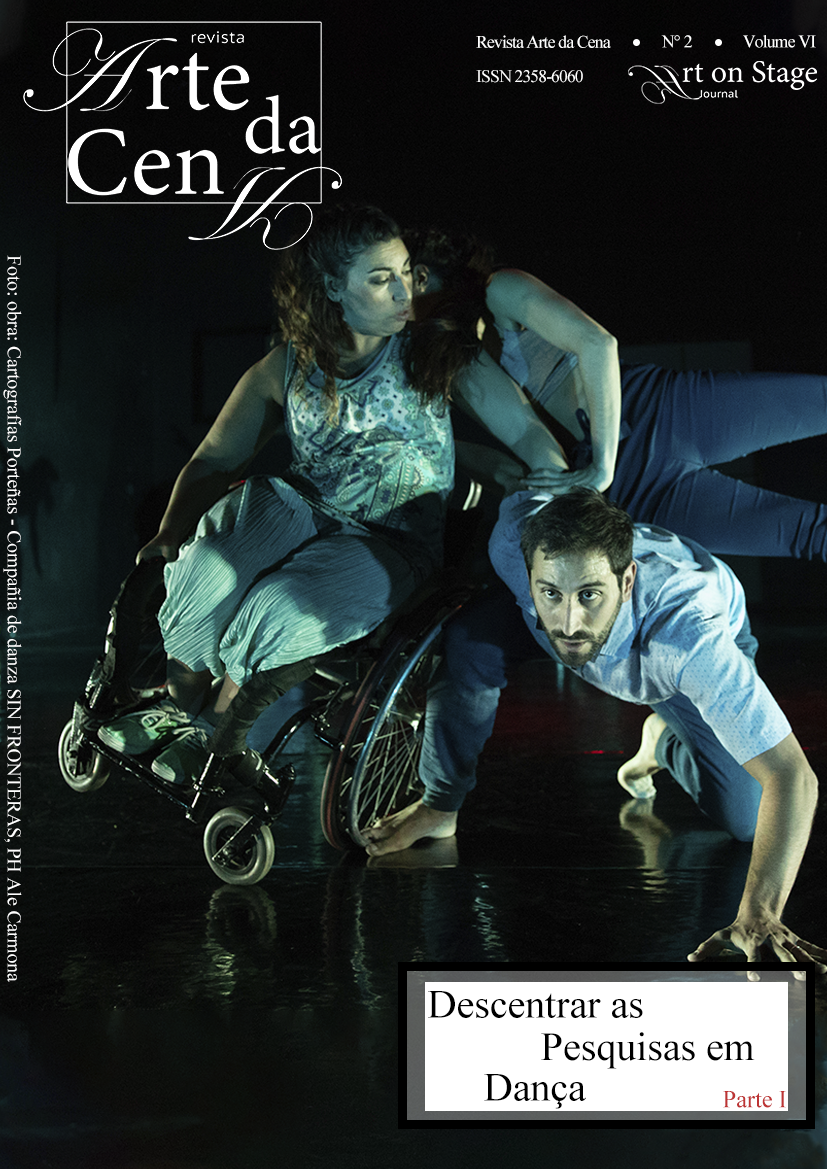PENSARFAZER DANÇA DESDE UMA PERSPECTIVA CONTEMPORÂNEA E DECOLONIAL
DOI:
https://doi.org/10.5216/ac.v6i2.65655Abstract
The work aims to propose a thinkingdo processes of teachlearning in dance from a contemporary and decolonial perspective. It was possible to identify points of convergence between the contemporary dance perspective and the decolonial thinking of education, since both currents of thought criticize the traditional way of education and share the following pedagogical presuppositions: horizontality in the teacher- student relationship; dialogicity; inseparability between theory, defense of democracy and respect for the plurality of bodies and knowledge. The decolonial perspective of dance complements the contemporary perspective by questioning Eurocentrism in dance, expressed in the unequal appreciation of dance techniques and aesthetics of the European tradition when compared to dances that come from other cosmologies, such as dances of african-brazilian e indigenous origin. In this sense, thinkingdo processes of teachlearning in dance from a contemporary and decolonial perspective goes through the valuation of decolonial dance pedagogies, by the creation of an intercultural dance curriculum that contributes to the repositioning of Brazilian traditional dances in the formal spaces of dance teaching, as well as the equitable valorization of dance aesthetics from Europe and the USA when compared to the aesthetics of dances produced by Latin American countries.
Keywords: dance; decolonial; interculturality; teachlearning; thinkingdo
Downloads
References
CORRÊA, Josiane Franken; SANTOS, Vera Lúcia Bertoni dos. Dança na Educação Básica: apropriações de práticas contemporâneas no ensino de dança. Revista Brasileira de Estudos da Presença. Porto Alegre, v. 4, n. 3, 2014. p. 509-526.
CASTILHOS, ALEXANDRA; PURPER, Raquel. Estudos Coreográficos no Ensino Superior de Dança In: Revista de Ciências Humanas. Universidade Federal de Viçosa, 2014.
Currículo em Movimento da Educação Básica do Distrito Federal, 2ª Edição, SEEDF, 2018. Minuta. Versão para consulta pública. Disponível em: http://www.se.df.gov.br/wp-conteudo/uploads/2018/08/Curriculo-em-Movimento-da-Educa%C3%A7%C3%A3o-Basica-CONSULTA-P%C3%9ABLICA-minuta.pdf. Acesso em junho 2019.
DANTAS, Mônica. De que são feitos os dançarinos de “aquilo...”: criação coreográfica e formação de intérpretes em dança contemporânea. Movimento, Porto Alegre, v. 11, n. 2, p. 31-57, maio/ago. 2005. DANTAS, Mônica. Corpos em trânsito/Corpos
DUSSEL, E. 1492 - El encubrimiento del Otro: hacia el origen del “mito de la Modernidad”. La Paz: UMSA - Facultad de Humanidades y Ciencias de la Educación; Plural Editores, 1994. (Colección Academia, n.1).
FANON, F. Os condenados da terra. Trad. Enilce Albergaria Rocha e Lucy Magalhães. Juiz de Fora/MG: Editora UFJF, 2005.
FREIRE, P. Pedagogia do Oprimido. 47ª Ed. Petrópolis: Vozes, 2005 (1970).
GONÇALVES, Thais. Arte e poder: relações entre corpo, dança e política In: IV Jornada InternacionaL de Políticas Públicas, 2009, São Luís - MA. Anais IV Jornada Internacional de Políticas Públicas - Neoliberalismo e lutas sociais: perspectivas para políticas públicas, 2009 v. 1 p. 1-9
LEPECKI, André. O corpo colonizado. Revista Brasil. Gesto Coreográfico do Rio de Janeiro, nº 2, v. 6, 2003.
MALDONADO-TORRES, Nelson. A topologia do Ser e a geopolítica do conhecimento. Modernidade, império e colonialidade. Revista Crítica de Ciências Sociais, 80, Março 2008.
QUIJANO, A. Colonialidade do poder, eurocentrismo e América Latina: In: LANDER, Edgardo (org.). A colonialidaede do saber, eurocentrismo e ciências sociais – perspectivas latino-americanas. Trad. Júlio Cesar Casarin Barroso Silva. Buenos Aires: CLASCSO, 2005, p. 117-142. Disponível em: , acesso em 11 de junho de 2016.
____________. Colonialidade do poder e classificação social. In: SANTOS, Boaventura de Sousa & MENESES, Maria Paula (Org.). Epistemologias do sul. São Paulo: Cortez, p. 84-130, 2010.
ROCHA, Thereza. O que é dança contemporânea? uma aprendizagem e um livro de prazeres. Salvador: Conexões Criativas, 2016.
SANTOS, Boaventura de Sousa. Para além do Pensamento Abissal: das linhas globais a uma ecologia dos saberes. In: SANTOS, Boaventura de Sousa. MENESES, Maria Paula. (orgs). Epistemologias do Sul. Coimbra: Edições Almedina, 2009
__________________________. Para uma sociologia das ausências e uma sociologia das emergências. Revista Crítica de Ciências Sociais, Coimbra, 63, p. 237-280, out. 2002.
SEGATO, Rita Laura. Brechas decoloniales para una universidad nuestroamericana. Em: Observatório da Jurisdição Constitucional, ano 5, 2011/2012.
WALSH, Catherine. Introdução: Lo pedagógico y lo decolonial: Entretejiendo caminhos. In: WALSH, Catherine. (org). Pedagogías decoloniales: Prácticas insurgentes de resistir, (re)existir y (re)vivir. Tomo I. Quito: Ediciones Abya-Yala, 2013.
WALSH, C. Interculturalidad, crítica y pedagogía de-colonial: apuestas (des) de el in-surgir, re-existir y re-vivir. Em: P. Melgarejo (Comp.). Educación Intercultural en América Latina: memorias, horizontes históricos y disyuntivas políticas. Ciudad de México: Universidad Pedagógica Nacional / CONACIT / Plaza y Valdés, pp. 25-43, 2009.
Vídeos
CARVALHO, J.J. Palestra de José Jorge de Carvalho proferida no Encontro de Saberes, Rio de Janeiro Disponível em <https://www.youtube.com/watch?v=R_0rIcsrvF0>. Acesso em junho de 2016.
CONEXÃO CIÊNCIA. Entrevista com José Jorge de Carvalho sobre Saberes Tradicionais. Disponível https://www.youtube.com/watch?v=ZKFsomUrbpw. Acesso em junho de 2017
Downloads
Published
How to Cite
Issue
Section
License
Copyright (c) 2020 Raquel Purper, Olga Brigitte Oliva de Araújo

This work is licensed under a Creative Commons Attribution-NonCommercial 4.0 International License.
The Art on Stage Journal uses the Creative Commons - Attribution-Non-Commercial 4.0 International license as a basis for transferring rights, for open access journals (Open Archives Initiative - OAI).
Authors who publish in this journal agree with the following terms:
1) Authors retain the copyright and grant the Art on Stage Journal the right to first publication, with the work simultaneously licensed under the Creative Commons Attribution Non Commercial License.
2) Authors are authorized to assume additional contracts separately, for non-exclusive distribution of the version of the work published in this Journal (eg, publishing in institutional repository or as a book chapter), with acknowledgment of authorship and initial publication in this journal.
3) Authors are allowed and encouraged to publish and distribute their work online (eg in institutional repositories or on their personal page) at any point before or during the editorial process, provided that the reference to the place of publication is cited, that is, the electronic address / reference of Art on Stage Journal.
4) The authors of the works published in the Art on Stage are expressly responsible for their content.
5) Authors will not be paid for publication of works in the Art on Stage Journal.



